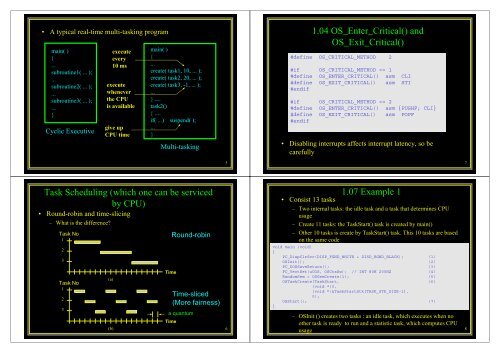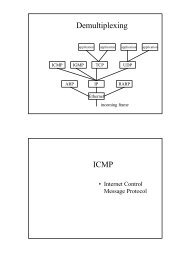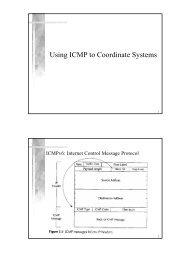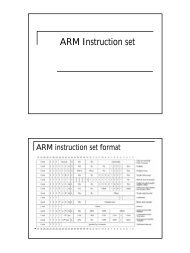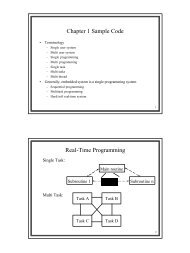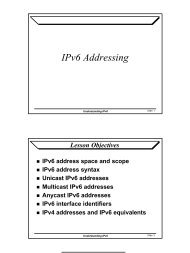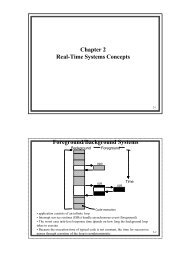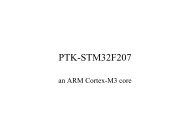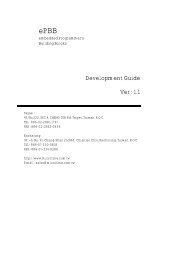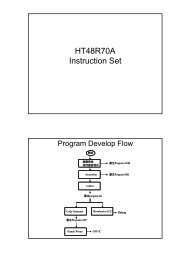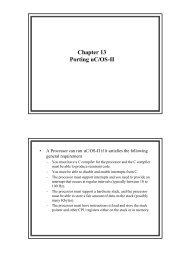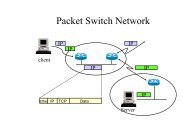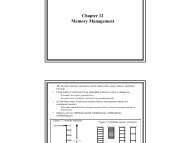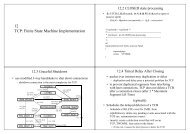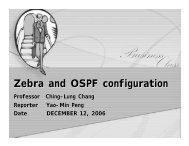Chapter 1 Sample Code Real-Time Programming Two Types of ...
Chapter 1 Sample Code Real-Time Programming Two Types of ...
Chapter 1 Sample Code Real-Time Programming Two Types of ...
Create successful ePaper yourself
Turn your PDF publications into a flip-book with our unique Google optimized e-Paper software.
• A typical real-time multi-tasking program<br />
main( )<br />
{<br />
...<br />
subroutine1( ... );<br />
...<br />
subroutine2( ... );<br />
...<br />
subroutine3( ... );<br />
...<br />
}<br />
Cyclic Executive<br />
execute<br />
every<br />
10 ms<br />
execute<br />
whenever<br />
the CPU<br />
is available<br />
give up<br />
CPU time<br />
main( )<br />
{<br />
...<br />
create( task1, 10, ... );<br />
create( task2, 20, ... );<br />
create( task3, -1, ... );<br />
...<br />
} ....<br />
task2()<br />
{ ....<br />
if( ...) suspend( );<br />
...<br />
}<br />
Multi-tasking<br />
1.04 OS_Enter_Critical() and<br />
OS_Exit_Critical()<br />
#define OS_CRITICAL_METHOD 2<br />
#if OS_CRITICAL_METHOD == 1<br />
#define OS_ENTER_CRITICAL() asm CLI<br />
#define OS_EXIT_CRITICAL() asm STI<br />
#endif<br />
#if OS_CRITICAL_METHOD == 2<br />
#define OS_ENTER_CRITICAL() asm {PUSHF; CLI}<br />
#define OS_EXIT_CRITICAL() asm POPF<br />
#endif<br />
• Disabling interrupts affects interrupt latency, so be<br />
carefully<br />
5<br />
7<br />
Task Scheduling (which one can be serviced<br />
by CPU)<br />
• Round-robin and time-slicing<br />
– What is the difference?<br />
Task No<br />
1<br />
2<br />
3<br />
Task No<br />
1<br />
2<br />
3<br />
(a)<br />
(b)<br />
<strong>Time</strong><br />
<strong>Time</strong><br />
Round-robin<br />
<strong>Time</strong>-sliced<br />
(More fairness)<br />
a quantum<br />
6<br />
1.07 Example 1<br />
• Consist 13 tasks<br />
– <strong>Two</strong> internal tasks: the idle task and a task that determines CPU<br />
usage<br />
– Create 11 tasks: the TaskStart() task is created by main()<br />
– Other 10 tasks is create by TaskStart() task. This 10 tasks are based<br />
on the same code<br />
void main (void)<br />
{<br />
PC_DispClrScr(DISP_FGND_WHITE + DISP_BGND_BLACK); (1)<br />
OSInit(); (2)<br />
PC_DOSSaveReturn(); (3)<br />
PC_VectSet(uCOS, OSCtxSw); // INT 80H 200HZ (4)<br />
RandomSem = OSSemCreate(1); (5)<br />
OSTaskCreate(TaskStart, (6)<br />
(void *)0,<br />
(void *)&TaskStartStk[TASK_STK_SIZE-1],<br />
0);<br />
OSStart(); (7)<br />
}<br />
– OSInit () creates two tasks : an idle task, which executes when no<br />
other task is ready to run and a statistic task, which computes CPU<br />
usage<br />
8


